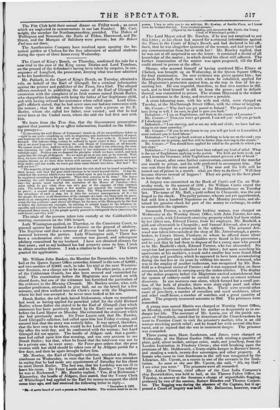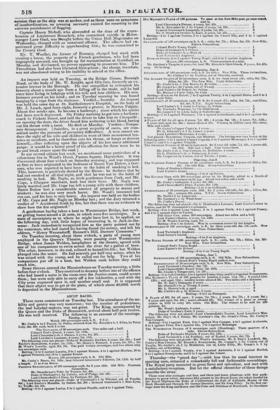Mr. William John Bankes, the Member for Dorsetshire, was held
to bail at the Queen Square Office yesterday, himself in the sum of 6,0001., and two sureties of 3,000/. each, to take his trial at the next Westminster Sessions, on a charge not to be named. The other party, a private of the Coldstream Guards, has also been secured and committed for trial. The examination before the Magistrate was carried on with closed doors, but one of the witnesses has furnished the particulars of the evidence to the Morning Chronide. Mr. Bankes senior, who, with another gentleman, attended to give bail, sat on the bench for a few minutes, and then walked into the Clerk's room with the Magistrate, where his bail was accepted : he never once looked at his son.
Dorah Butler, the tall dark-haired Irishwoman, whom we mentioned last week as having applied for parochial relief for the child Richard Butler, whose father she stated to be the Earl of Glengall (but which statement has been positively denied by the Earl) was again brought before the Lord Mayor on Monday. She reiterated the statement which she had previously made. Sir Peter Laurie said, that Mr. Rowley, Lord Glengall's solicitor, bad called upon him last Friday evening, and .assured him that the story was entirely false. It was agreed, therefore, that the best step to be taken, would be for Lord Glengall to attend at the office the next day, and be confronted with the woman ; but Lord Glengall did not appear. The beadle of Aldgate said, that a gentleman had called upon him that morning, and was very anxious to see Dorah Butler; but that, when he found that the interview was not to be a private one, be went away. Sir Peter gave orders that the poor 'woman with her child should be taken care of by Aldgate parish for a 'few days, and then be again brought before him.
Mr. Rowley, the Earl of Glengall's solicitor, attended at the Man. sionhouse on Wednesday, to state that the Lord Mayor was mistaken in saying that he had made any appointment of Saturday for his client to meet Dorah Butler. The fact was, that his Lordship was too ill to leave his room. Sir Peter Laurie said to Mr. Rowley, "You told me be was at Richmond." Mr. Rowley replied, "Yes, ill at Richmond." Kinnersley, the beadle of Aldgate, then stated, that the Vestry Clerk of Whiteehapel bad applied to the Earl for money to support the child some time ago, and had received the following letter in reply
" December 3, 1832. "Slt--1 nem beard of such a person as Dorah Butler. The woman must be an poster. I beg to refer you to my solicitor, Mr. Rowley, of Saville Place, as I leave town for Ireland thisslay. Your obedient servant."
(Signed by his Lordship, and directed to Me. Smith, the Vestry Clerk of Whitechapel parish)
The Lord Mayor asked Mr. Rowley, if he was not surprised to see this letter ; as his client had moved for a criminal information against the Times in the Court of King's Bench, and had declared in his affi davit, that he was altogether ignorant of the woman, and had never had any communication from her or with her ? Mr. Rowley replied, that he was not at all surprised to see the letter : it contained a denial of all knowledge of the matter ; to which denial his client still adhered. The further examination of the matter was again posponed, till the Earl could attend in person at the office.
Sharpe, who accused himself of having murdered Miss Elmes at Chelsea, was brought up on Wednesday, at the Queen Square Office, for final examination. No new evidence was given against him ; but Hannah Heywood, the woman with whom he cohabited, applied for the Magistrate's protection against him, as she was in fear of his as saulting her. He was required, therefore, to find two sureties in 20/. each, and to bind himself in 40/. to keep the peace ; and in default thereof, was committed to prison. The woman Heywood is the widow of a Lieutenant in the Army, and receives a pension.
A stout labouring man, with his wife and child, were charged on Tuesday, at the Marlborough Street Office, with the crime of begging. Mr. Conant—" Why don't you get passed to Ireland ? The parish you have been living in will, I am sure, be glad to pass you back."
Defendant—" I am an Englishman, and born in the county of Lancaster." Mr. Conant—" Then you won't get passed, I can tell you : will you go back if I discharge you?"
Defendant—" Ism starving, and so are my wife and child ; we have bad nothing to eat since yesterday.'
Conant—" If you do not choose to say you will get back to Lancashire, I must commit you to hard labour."
Defendant—" I can't go back without a farthing to help me on the road; you may commit me to prison, and that will be better than starving in the streets." Mr. Conant—" You should have applied for relief to the parish in which you last slept."
Defendant—" I have applied, and have been refused any kind of relief. What is the use of Englishmen applying to the parish. The Irish get both work and money from the Overseers, while Englishmen cannot get even a bit of bread."
Mr. Conant, after some further conversation, committed the man for one month to prison, and his wife preferred to accompany him. She was sent there for the same period. [The man and his wife will be turned out of prison in a month : what are they to do then ? Will they become thieves instead of beggars ? They are going to the best place to learn the trade.] A forgery was committed on the Bank of Curtis and Co. on Wednesday week, to the amount of 519/. ; Sir William Curtis stated the circumstances to the Lord Mayor at the Mansionhouse on Tuesday last. The name of Mr. Bull, a gold-refiner in Cheapside, was the one forged to the check. The guilty persons, who are not yet apprehended, had sold him a hundred Napoleons on the Monday previous, and obtained his genuine check for part of the money hi exchange, in order to counterfeit the signature.
Susannah Forster, a respectable looking woman, was charged on 'Wednesday at the Worship Street Office, with John Forster, her son, a mere youth, with feloniously receiving property which had been stolen by her eldest son, Edward Foster, from his employer, Mr. Banfield, a gold and silversmith in Cheapside ; and Samuel Attwood, also a young man, was charged as a principal in the robbery. The prisoner Attwood was taken into custody at the shop of Mr. Attenhorough, a pawnbroker, in Crown Street, Finsbury, to whom he offered some silver' spoons ; jewellery and other valuables were found in his possession;. and he said that he had them to dispose of for a young man who proved to be Mr. Banfield's clerk, Edward Forster, who has absconded. No suspicion had previously attached to the latter ; but upon searching his apartments at his mother's, a trunk and a smaller box were found filled with plate and jewellery, which he appeared to have been accumulating during the last five or six years by robbing his master. A ttwood, who was in the employ of another tradesman, was recognized by Mr. Banfield as a frequent visitor of Forster; and it was supposed that, on these occasions, he assisted in carrying away the stolen articles. The display of the stolen property before the Magistrate excited astonishment that the system of robbery could be carried on to such an extent without discovery. In one morocco case alone, which formed but a small portion of the bulk of plunder, there were sixty-eight pearl and other costly rings, besides brooches, lockets, &c. There were several other cases of jewellery, a number of cornelian and coral necklaces, silver and other snuff-boxes, a number of watches, and a great quantity of plate. The property recovered amounts to 7801. The prisoners were remanded.
A young man named Martin was charged at Worship Street Office, on Monday, with having assaulted his mother so desperately as to endanger her life. The assistant of Mr. Lewis, one of the parish surgeons of Shoreditch, stated that by directions of the Churchwardens he went to Prentice Court to visit the prisoner's mother, who is an old woman receiving parish relief; and he found her with several ribs fractured, and so injured that she was in imminent danger. Th,e prisoner was remanded.
Three young men, Shaw, Sanderson, and Jones, were charged on Wednesday, at the Hatton Garden Office, with stealing a quantity of plate, gold, silver medals, antique coins, seals, and jewellery, from the London Institution in Finsbury Circus ; also with breaking open the premises of Mr. Holdsworth, a livery-stable-keeper in Berner's Street, and stealing a watch, twenty-five sovereigns, and other property. A female who came to visit Sanderson in the cell was recognized by the Librarian, Mr. Upcott, as a cousin to one of the servants in the Institution. As soon as she saw Mr. Upcott, she said, " Ah, my God ! I see what you want." The prisoners were all remanded.
Mr. Arthur Vincent, chief officer of the East India Company's ship Berwickshire, was held to bail, at the Thames Police Office, on Tuesday, to answer at the Sessions a charge of unjustifiable flogging, preferred by two of the seamen, Robert Bowden and Thomas Carpenter. The flogging was during the absence of the Captain, but it appeared a Court of Inquiry was held. Mr. Bullantine, however, was of opinion that as the ship was at anchor, and as there were no symptoms of insubordination, no pressing necessity existed for resorting to the extreme punishment of flogging.
Captain Henry Nichol!, who absconded at the time of the apprehension of .Lieutenant Beauelerk, who committed suicide in Horsemenger Lane Gaol, was brought before the Union Hall Magistrates on Wednesday, charged with an unnatural offence. The officers had experienced great difficulty in apprehending him ; he was committed to the County Gaol. Mr. T. Woollet, the farmer of Romney, charged last week with stealing a horse, the property of a French gentleman, who bad been improperly arrested, was brought up for reexamination at Guildhall on Monday, and discharged, no person appearing to prosecute him. The Frenchman had also been liberated from prison ; the charge, therefore, was not abandoned owing to his inability to attend at the office.



















 Previous page
Previous page